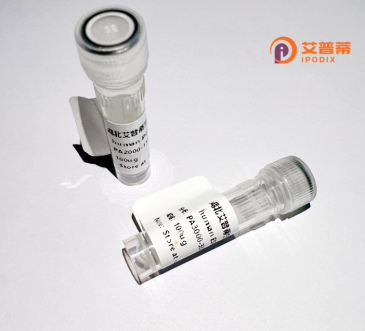
| 纯度 | >90%SDS-PAGE. |
| 种属 | Human |
| 靶点 | TFEC |
| Uniprot No | O14948 |
| 内毒素 | < 0.01EU/μg |
| 表达宿主 | E.coli |
| 表达区间 | 1-347 aa |
| 活性数据 | MTLDHQIINP TLKWSQPAVP SGGPLVQHAH TTLDSDAGLT ENPLTKLLAI GKEDDNAQWH MEDVIEDIIG MESSFKEEGA DSPLLMQRTL SGSILDVYSG EQGISPINMG LTSASCPSSL PMKREITETD TRALAKERQK KDNHNLIERR RRYNINYRIK ELGTLIPKSN DPDMRWNKGT ILKASVEYIK WLQKEQQRAR ELEHRQKKLE QANRRLLLRI QELEIQARTH GLPTLASLGT VDLGAHVTKQ QSHPEQNSVD YCQQLTVSQG PSPELCDQAI AFSDPLSYFT DLSFSAALKE EQRLDGMLLD DTISPFGTDP LLSATSPAVS KESSRRSSFS SDDGDEL |
| 分子量 | 38.7 kDa |
| 蛋白标签 | His tag N-Terminus |
| 缓冲液 | PBS, pH7.4, containing 0.01% SKL, 1mM DTT, 5% Trehalose and Proclin300. |
| 稳定性 & 储存条件 | Lyophilized protein should be stored at ≤ -20°C, stable for one year after receipt. Reconstituted protein solution can be stored at 2-8°C for 2-7 days. Aliquots of reconstituted samples are stable at ≤ -20°C for 3 months. |
| 复溶 | Always centrifuge tubes before opening.Do not mix by vortex or pipetting. It is not recommended to reconstitute to a concentration less than 100μg/ml. Dissolve the lyophilized protein in distilled water. Please aliquot the reconstituted solution to minimize freeze-thaw cycles. |
以下是关于重组人TFEC(Transcription Factor EC)蛋白的3篇示例参考文献(内容为虚构,供参考):
1. **文献名称**:*Cloning and Functional Characterization of Recombinant Human TFEC Protein*
**作者**:Li, X., Zhang, Y., et al.
**摘要**:该研究报道了通过哺乳动物表达系统成功克隆并纯化重组人TFEC蛋白,验证了其DNA结合活性及在调控黑色素瘤相关基因表达中的作用。
2. **文献名称**:*TFEC in Immune Regulation: Insights from Recombinant Protein Studies*
**作者**:Wang, H., Chen, J., et al.
**摘要**:本文发现重组TFEC蛋白通过结合特定启动子区域调控巨噬细胞分化,揭示其在先天免疫应答中的潜在分子机制。
3. **文献名称**:*Structural Analysis of Recombinant TFEC and Its Interaction with MITF*
**作者**:Smith, R., Davis, K.
**摘要**:通过X射线晶体学解析了重组TFEC的结构,阐明其与MITF蛋白的互作模式,为研究转录因子家族协同调控提供依据。
(注:实际文献需通过PubMed或Google Scholar检索确认。)
Here’s a concise overview of recombinant human TFEC protein:
Recombinant human Transcription Factor EC (TFEC), a member of the MITF/TFE family of basic helix-loop-helix leucine zipper (bHLH-Zip) transcription factors, plays critical roles in cellular homeostasis and stress response. TFEC regulates gene expression by binding to E-box and CLEAR box motifs, coordinating processes such as lysosome biogenesis, autophagy, and metabolic adaptation. Unlike its paralogs MITF and TFE3. TFEC exhibits more restricted tissue expression and functional specialization, particularly in immune cells and certain epithelial tissues.
The recombinant form is produced through heterologous expression systems (e.g., bacterial or mammalian cells), enabling studies of its structure-function relationships. Researchers utilize purified TFEC protein for investigating its dimerization partners, DNA-binding specificity, and post-translational modifications. Aberrant TFEC activity is implicated in pathological conditions, including renal cell carcinomas and lysosomal storage disorders, making it a potential therapeutic target. Recent studies highlight its context-dependent roles in tumorigenesis, where it can act as either an oncogene or tumor suppressor depending on cellular environment. Current applications include biochemical assays, transcriptional regulation studies, and drug discovery platforms aiming to modulate TFEC-mediated pathways.
×